How to Get Your Operator of Uninspected Passenger Vessel (OUPV) Captain’s License
Published: 03/26/2025
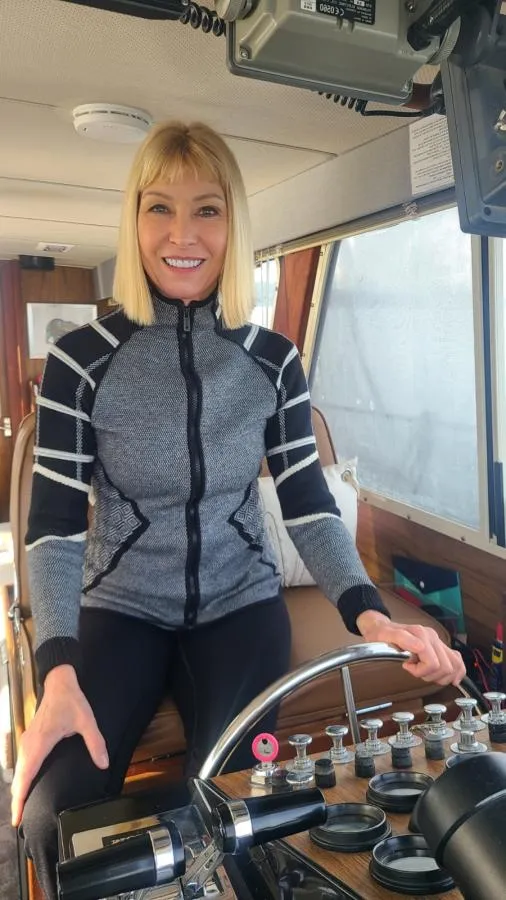
Captain Maria Faires Naumann
This article provides a comprehensive guide on obtaining an OUPV (Operator of Uninspected Passenger Vessels) Captain's License. It details the benefits of having this maritime license, including increased confidence, safety and expanded boating opportunities.
Join me as we explore the online coursework offered by Mariners Learning System (MLS), covering vital topics from expert navigation skills and the essential "rules of the road" to paramount boating safety protocols.
I'll walk you through the step-by-step journey of securing your license, including my tips for passing the US Coast Guard exam, meticulously gathering the documents required for the USCG MMC Application including your sea time, obtaining your TWIC card, navigating the physical and drug testing requirements, and completing crucial CPR/First Aid training.
Plus, I'll share valuable insights and study tips to help you ace your USCG Captain's Final Exam and even offer access to a comprehensive Captain's License Exam Study Guide and a detailed Captain's License Quiz Question Compilation to ensure you're fully equipped for success.
What is an Operator of Uninspected Passenger Vessel (OUPV) Captain’s License?
An OUPV (Operator Uninspected Passenger Vessel) license, often called a "Six-Pack" license, allows you to operate uninspected passenger vessels carrying up to six paying passengers.
Even if you're not planning to operate a charter boat, an OUPV license demonstrates your commitment to safe boating practices.
Getting your license will teach you more about navigation and maritime safety compared to the basic boating safety course that most states require. The Captain's License signifies that you've mastered essential skills and knowledge, making you a more responsible and confident operator. This translates to safer outings for you, your passengers, and everyone else on the water.
Why Get Your (OUPV) Captain’s License?
I recently earned my USCG OUPV Captain's License, a milestone that marks a significant step in my recreational boating journey. This achievement was driven by a deep desire to enhance both my skills and my confidence on the water.
As a woman in recreational boating, I often envisioned confident women at the helm, a vision that ignited my own desire for complete independence on the water. I wanted to be one of them, capable of handling every aspect of boating myself. Beyond personal aspiration, safety was a key motivating factor. With my husband, George, usually in control, the question always lingered: what if I needed to take over?
The need for self-reliance and the desire to be fully prepared on the water became a powerful motivator. Obtaining a Captain's license was about developing the confidence and knowledge to safely navigate any scenario with absolute assurance.
The rigorous training and advanced knowledge now allow me to fully relax and enjoy my time on the water, knowing I am equipped to handle whatever might arise. In addition, the license represents a gateway to expanded boating destination opportunities.
Earning my Captain's License will allow us to charter larger and more capable vessels worldwide, dramatically expanding our boating adventure possibilities. The license signifies a mastery of advanced boat skills, which considerably simplifies renting a boat.
Although a USCG Captain's License isn't always mandatory for recreational rentals, it undoubtedly smooths the way by alleviating insurance concerns and providing rental companies with clear evidence of our competence, often unlocking access to a wider selection of boats.
Having a USCG Captain's License will allow George and me to confidently plan trips beyond our usual cruising grounds and explore incredible destinations such as the Great Loop, Thailand, Greece, Italy, the French Riviera, Croatia, and the British Virgin Islands.
How Mariners Learning System Can Help You Get Your OUPV Captain's License
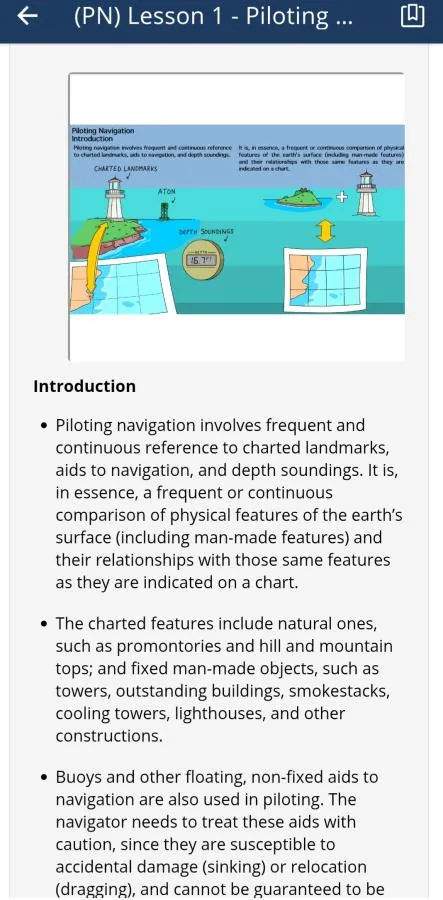
Screenshot from the MLS App
Instead of an in-person course, I chose the Mariners Learning System (MLS) online course to obtain my USCG OUPV Captain’s license, and I'm glad I did.
I found the Mariners Learning System (MLS) to offer an exceptionally flexible and comprehensive learning experience, perfectly aligning with my need to study at my own pace. Being a USCG-approved program, MLS provided a complete and well-organized learning journey, covering all the necessary topics and materials in a structured way. This convenient online format proved to be an invaluable alternative to the constraints of traditional classroom environment.
The course is a flexible learning experience, accessible via both app and desktop. Each lesson blended audio lectures, written lectures, engaging visuals like videos and simulations, quizzes, exam practice questions and electronic flashcards to use as a study guide. I found this multi-sensory approach highly effective, reinforcing concepts through reading, listening, and watching.
Dedicating roughly 14 hours per week for five months, I found the course material to be engaging and well-structured, covering everything needed for the USCG examinations. The flexibility of online learning suited my schedule perfectly. I found their curriculum thoroughly prepared me for the USCG examination.
If you’re interested in pursuing your OUPV license, I recommend looking into Mariners Learning System.
Unlock Your Captain's Future with Savings: If the link doesn't work contact me.
Become a Captain: MLS Discount!How I Studied for the Captain’s License Exam
To organize my studies, I created a binder containing printed materials I printed directly from the MLS course – lessons, notes, and quizzes – structured to mirror the exam's content.
Driven by a desire for thorough preparation, I meticulously compiled every available captain's license quiz question and answer from every source I could find on the internet to ensure I was comprehensively ready for the final exam. I believe studying this comprehensive compilation of quiz questions was the ultimate secret to my achieving such high scores on the exam.
While instructor support from MLS was available, I found the self-paced, resource-rich multi-faceted learning method to work well for me.
For those inevitable moments of confusion, online resources, particularly Chesapeake Marine Training Institutes's videos, were invaluable for clarifying complex concepts.
Key Topics Covered in the OUPV Captain’s Course
The OUPV course covers a wide range of essential topics, including:
Piloting Navigation:
- ATON identification, position fixing, course plotting, and instrument use for safe coastal navigation.
Navigation General:
- Chart Reading & Navigation: Interpreting nautical charts, plotting courses, and using navigational aids.
- Electronic Navigation: Utilizing modern navigation technology.
- Tides & Tidal Currents: Predict their effects and understand how they impact navigation and passage planning.
- Magnetic Compass: Covers its operating principles, variation/deviation errors, course conversions, and navigational use, ensuring accurate bearings despite magnetic influences.
- Aids to Navigation: (ATONs) training teaches you to identify and interpret buoys, beacons, and lights, enabling safe navigation by understanding their meanings and uses on charts.
- Electronic Navigation: covers the use of GPS, radar, chart plotters, and other electronic tools for accurate vessel positioning and safe navigation
Deck General and Safety: Safe practices and procedures on deck.
- Firefighting: Fire suppression and emergency response.
- Lifesaving Equipment: Proper use and maintenance of safety gear.
- Emergency Procedures: Actions to take in various emergency situations.
- Marlinespike & Deck Seamanship: It involves proficiency in tying various knots, hitches, and bends for different purposes (e.g., docking, mooring, towing). Understanding the properties and uses of different types of lines (ropes) is crucial.
- Marine Engines Operations: Basic engine checks and vessel care.
Rules of the Road:
- Lights & Day Shapes: These visual signals tell you a vessel's type, size, and activity, especially at night or in poor visibility.
- Sound & Light Signals: These audible signals communicate intentions, warnings, and distress, particularly in restricted visibility.
- Steering & Sailing Rules: These dictate who has the right-of-way in various meeting situations (head-on, crossing, overtaking), preventing collisions.
- Restricted Visibility Conduct: These rules govern how vessels must behave in fog, rain, etc., emphasizing reduced speed and increased awareness.
- Differences Between International & US Inland Rules. A key distinction between Rules lies in their sound signals and right-of-way interpretations, particularly in meeting, crossing, and overtaking situations.
- Boat Handling & Maneuvering: Maneuvering in various conditions. Docking and close-quarters handling, vessel handling and stability.
- Anchoring & Mooring: Anchor types, anchoring techniques, and how to safely anchor in various conditions.
- Environmental protection: This covers the regulations and practices to protect the marine environment and understanding environmental regulations.
- Meteorology Marine Weather: Understanding weather patterns and forecasts.
- Maritime Law & Regulations: Legal requirements for vessel operation.
- Marine Radiophone: FCC rules, operating procedures, distress/safety calls, emergency use, equipment, and digital communication.
These areas of study are essential for anyone seeking an OUPV Captain's License, as they ensure that operators have the knowledge and skills to operate vessels safely and responsibly.
The Operator of Uninspected Passenger Vessels (OUPV) USCG Final Examination
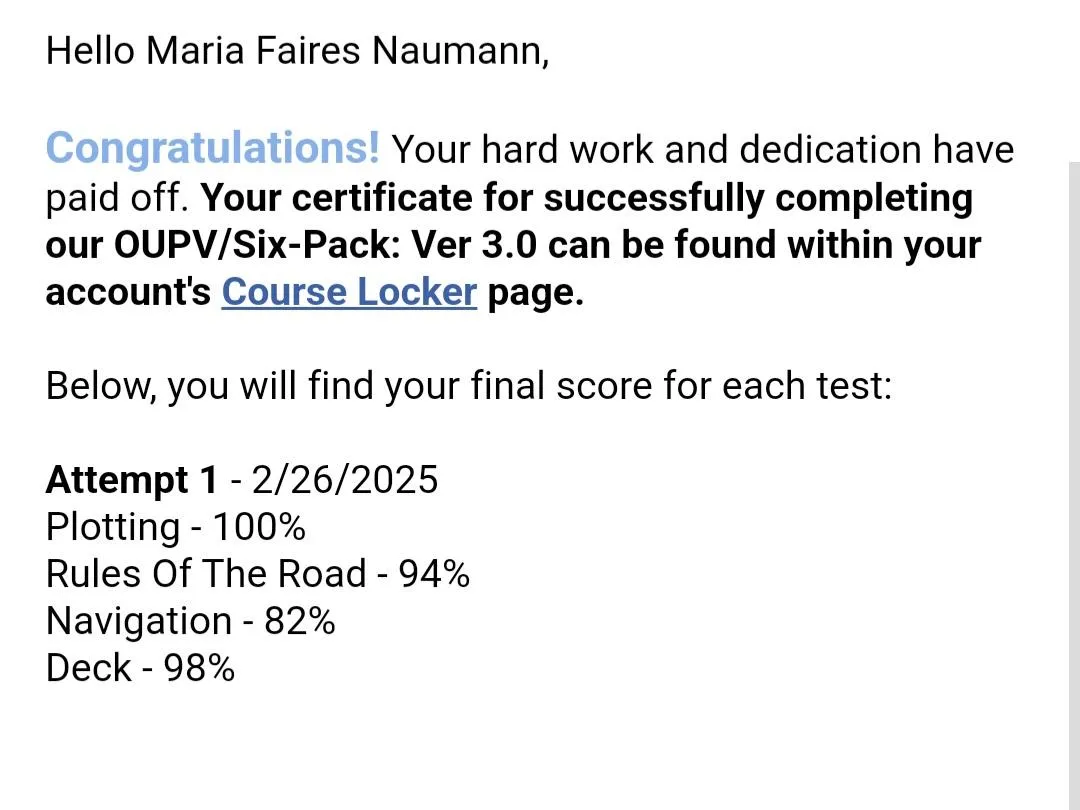
MY FINAL EXAM RESULTS
The final exam is proctored and I was able to do the test in my home through Mariners Learning System. The online proctored exams are available 24/7 and they provided all the instructions that I needed to set up my office to take the test.
The questions on the Captain's License final exam through the MLS are drawn from the material covered in the course, including quizzes and practice questions so I knew what to expect and studied primarily from the bank of questions that I complied.
The OUPV exam typically includes multiple-choice questions on various topics, including Deck General, Navigation, Chart Plotting, and Rules of the Road.
You need to correctly answer a certain number of questions for each topic in order to pass the exam.
90% Plotting, 10 questions.
70% Deck General, 50 questions.
70% for Navigation, 50 questions.
90% for Rules of the Road, 50 questions.
One advantage to taking the Mariner’s Learning System course is, unlike the Coast Guard’s exam, which draws from a bank of more than 10,000 questions, the MLS exam is based directly on their curriculum. So I focused on studying their lecture Notes, quizs and final exam questions in preparation for the final USCG exam. I felt I knew where I stood during each stage of my exam preparation and that the coursework prepared me for the final exam.
Driven by a desire for thorough preparation, I meticulously compiled every available captain's license quiz question to ensure I was comprehensively ready for the final exam. I believe this comprehensive compilation of quiz questions was the ultimate secret to my achieving such high scores on the exam.
Pass Your Captain's License Exam with Confidence: Comprehensive Quiz Question Bank
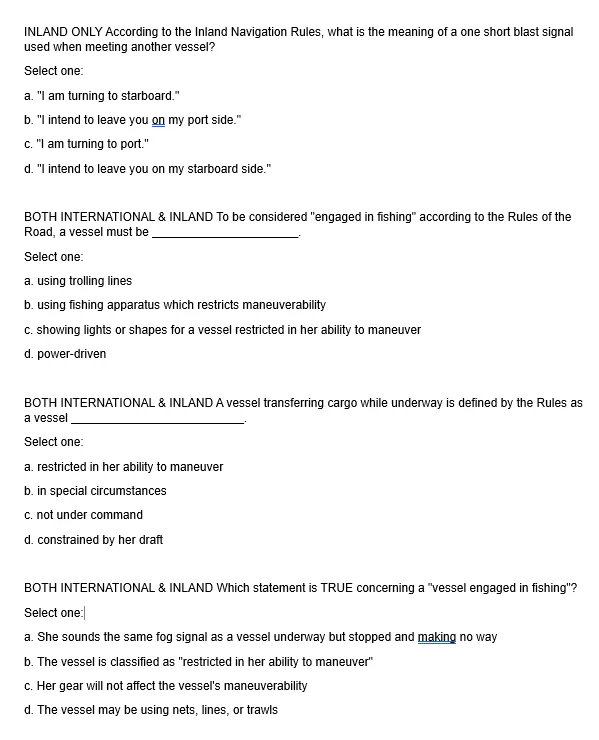
U.S. Coast Final Test Questions
Pass Your Captain's License Exam with confidence using my Comprehensive Quiz Question Bank, designed to streamline your study process and maximize your chances of success.
Master your USCG Captain's License Exam (OUPV) with my 200-page Comprehensive Quiz Question Bank.
I've done the hard work for you, compiling all the practice questions you'll encounter into this single, detailed study guide.
This resource was the key to my own success and is now available to make getting your captain's license easy and confident.
I've assembled 200 pages of all the quiz questions you'll encounter.
Study smart and secure your certification! Contact me to buy your downloadable, printable question bank.
You can secure this essential 200-page Comprehensive Quiz Question Bank for just $68.
CONTACT ME AND ASK FOR THE COMPREHENISVE QUESTIONS GUIDECost to Obtain an OUPV USCG Captain’s License
- Mariners Learning System Course $695 (discount available)
- USCG Exam Fee (if not included in the course): Some schools, like Mariners Learning System, include the online exam fee. However, if you were to test at a USCG Regional Exam Center, there might be an additional fee (around $95).
- Physical Exam and Medical Form $100-$300
- CPR AED First Aid Course $60
- MMC Application Fee $145
- TWIC Card $124
- Drug Test $90
Costs in February 2025
Steps to Getting an OUPV License and How to Apply for a MMC Merchant Mariner Credential
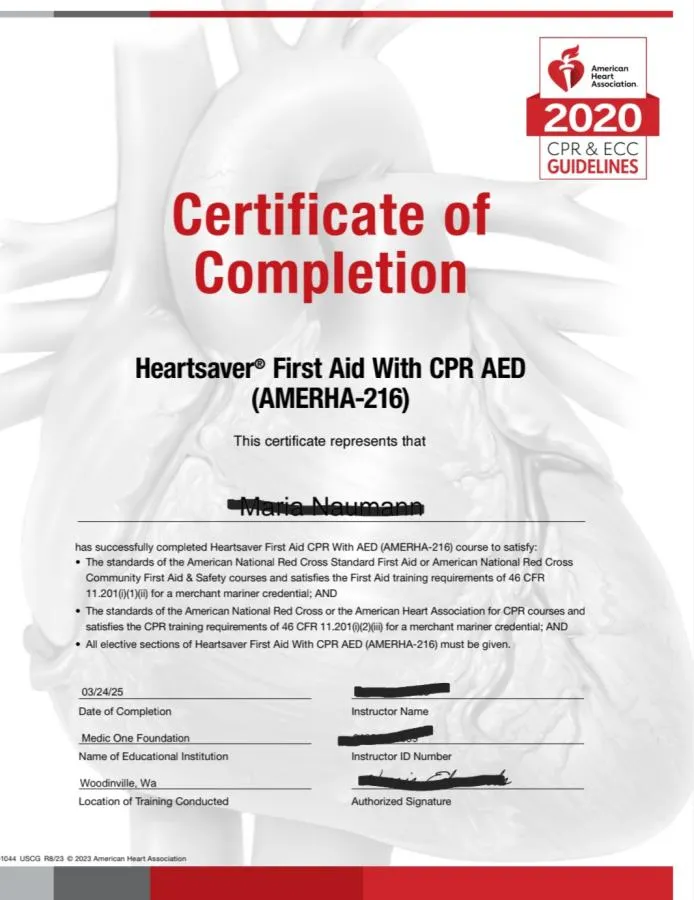
Your First Aid CPR, AED Certificate MUST look like this
The application to get a Merchant Mariner Credential is notoriously difficult. I have taken details notes as I have gone through the process and provide the information here for you. The biggest difficulty I had was with the First Aid, CPR, AED course certificate. They did not accept the course certificate from my instructor. This delayed my application being approved by several months. Note the additional step needed from the instructor below.
Enroll in an OUPV course.
Complete the course modules and practice exams.
Pass the course’s final exam.
Pass the U.S. Coast Guard proctored exam. (I was able to do mine at home)
Refer to this USCG How to Apply for an Merchant Mariner Credential.
Document proof of minimum of 360 days of sea time on form CG-719S. This will help you fill it out. This will too.
Obtain a Transportation Workers Identification Credential (TWIC Card). I got mine at a TSA Precheck Kiosk at Staples Office Supply.
Pass a Physical Examination using form CG-719K. For most recreational boaters select Deck AND Food Handler in the Endorsment Sought section. Research common errors when submitting this form. What endorsement should you select help here. You need to turn your medical paperwork into a pdf named Name, First Name, CG719K. Email the completed form to MEDAIP@uscg.mil. Subject line of your email should be this: Last Name, First Name, CG719K. Email should say this, "Attached is my completed CG719K. Please let me know if you have any issues or questions with this medical application."
Pass a DOT Drug Test. The U.S. Coast Guard mandates a DOT 5-panel drug test, also known as a SAMHSA 5-panel Test must be done by a SAMHSA-certified lab. The test results must be reviewed by a Medical Review Officer. The CG-719P form is used. I used Fastest Results Testing in Tukwila, WA. 206-483-1670.
Adult CPR/Basic First Aid training. You can take in-personal (not online) courses from the American Heart Association (AHA), the American Red Cross (ARC), or from USCG-approved maritime training schools, ensuring you have a certificate with the appropriate course code AMERHA-216. The AHA's Heartsaver First Aid CPR AED Course meets the requirements. The American National Red Cross Standard First Aid course or the American National Red Cross Community Adult First Aid and Safety course are also acceptable.
I took the Heartsaver AMERHA-218 CPR/AED and First Aid Training in person from the MedicOne Foundation. I highly recommend MedicOne! The instructors, all certified professionals, delivered a fantastic learning experience. They provided clear, comprehensive instruction and ample hands-on practice. And they were willing to work with me afterwards to provide the special credentialing that the Coast Guard requires. The Coast Guard application requires a special certificate that an instructor has to access and generate from their Instructor Portal.
You MUST have the USCG Approved Certificate even if you have a course certificate with the correct course code! See the photo to the right.
Steps to ask your AHA AHA Heartsaver, first aid, CPR, AED course instructor to do:
- Have your instructor log in to the American Heart Association Instructor Network. Go to the Courses drop down menu and select Heartsaver.
- Scroll to the bottom of the page. Click the miscellaneous drop down menu for the information on the US Coast Guard approved AHA Heartsaver First Aid CPR AED Course and Certificate.
- Download the US Coast Guard approved AHA Heartsaver, first aid, CPR, AED course and certificate inside their instructor network.
- E-mail you the PDF of the US Coast Guard approved AHA heart saver, first aid, CPR, AED course and certificate.
Complete an application for Merchant Mariner Credential Form CG-719B. Help for filling out this form found here. And also here. USCG Video Presentation How to Fill Out Form. Help for Section II Description of Endorsement Desired section here. For an OUPV it is NATIONAL OPERATOR OF UNINSPECTED PASSENGER VESSELS NEAR COASTAL WATERS (or whatever waters you have your documented seatime in). NOTE: On December 17th , 2024 the Coast Guard removed the need for it be notarized or to take an Oath so ignore any instructions you might read elsewhere to do so.
Pay for the MMC application fee here. Use this form to pay your US Coast Guard Merchant Mariner License and Documentation (MLD) Program User Fees for the evaluation of your application. The Pay.gov payment confirmation with tracking ID must be submitted with your CG MMC application. Print a copy of your payment receipt to send with your application package.
Complete a USCG Original License Application Package. Scan all documents (but not the physical exam form CG-719K) and turn them into pdf format. Attach all the following to an email to MMCApplications@uscg.mil with a subject line LastName_FirstName.
- MMC For CG-719B
- Proof of application fee paymeny
- Your completed course certificate
- DOT Drug Testing Results
- CPR AED First Aid Class Certificate
- Sea Service Form CG-719S
- If you got your sea service on your own boat include a copy of your USCG Certificate of Documentation
- TWIC Card
- Copy of your passport or birth certificate
It took 10 weeks from the time I emailed the application to when I recieve the license in the mail.
Need help? Call 1-888-427-5662 U.S. Coast Guard’s National Maritime Center.
To the best of my ability, all information provided was accurate as of April 2025, with no liability assumed. Do your own research to make sure this is up to date.
Join Me on Healthy Boat Living

Captain Maria Faires Naumann and her husband George hosting a dinner on their boat with friends
With my Captain's License, my love for boating has reached a new level, and I'm thrilled to connect it with my expertise as a registered dietitian and master personal trainer.
Whether I'm navigating the Puget Sound or dreaming of cruising the Great Loop, the invigorating experience of life on the water has always felt like the ultimate complement to a healthy, active lifestyle.
As both a Registered Dietitian and a Master Personal Trainer, I specialize in helping people live well—and that shouldn't stop at the dock! I founded "Healthy Boat Living" to share this unique perspective with fellow boaters. Here, we tackle the specific challenges of life afloat:
Galley Nutrition: Planning, provisioning, and preparing healthy meals in a small kitchen.
Deck Fitness: Effective exercises you can do on your boat or ashore.
Adventure: Finding the best boating destinations for an active lifestyle.
Let's make every voyage a journey toward better health!
Categories: Healthy Boat Living
Tags: #boatingbasics #boatingsafety #boatingskills #boatlife





